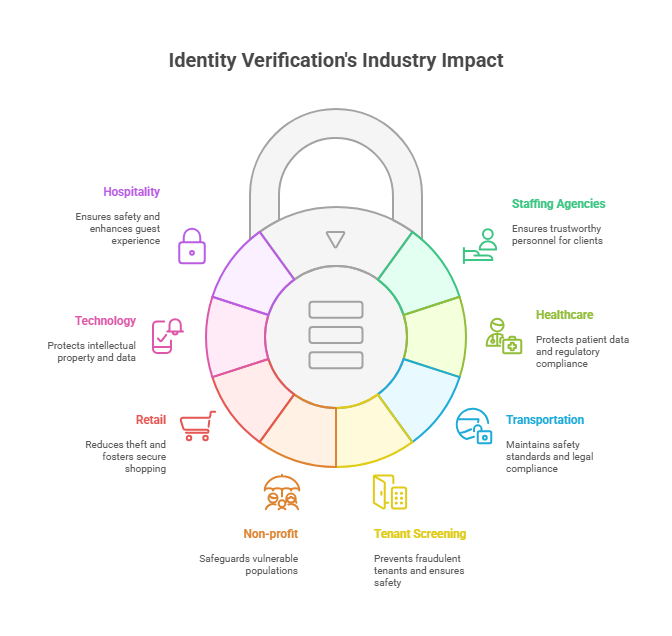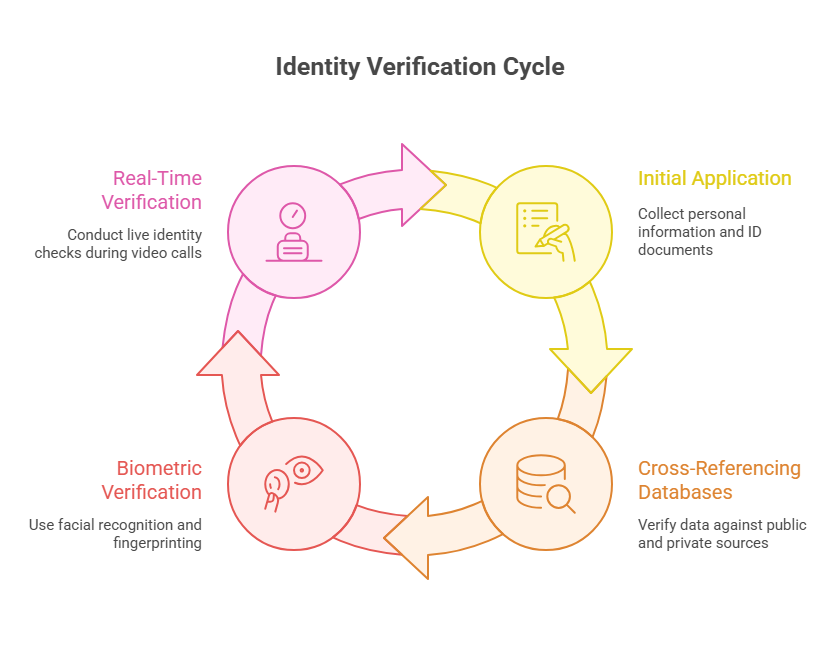In today's digital age, ensuring the authenticity of a new hire's identity has become crucial for businesses across various industries. From avoiding identity fraud to enhancing workplace security, identity verification processes help employers hire the right candidates confidently and legally.
This comprehensive guide delves into the important role of identity verification in hiring, aiming to aid business owners, HR professionals, recruiters, and job seekers. We will explore key points, ranging from the necessity of identity verification to best practices and legal considerations.
Key Takeaways
- Identity verification in the hiring process is essential for preventing identity fraud, protecting sensitive data, and maintaining workplace safety.
- The process involves verifying government-issued IDs, cross-referencing external databases, and utilizing biometric verification for additional security.
- Stringent identity verification is beneficial for different industries, including healthcare, transportation, and retail, to meet specific regulatory and safety needs.
- Legal compliance, including adherence to federal guidelines, anti-discrimination laws, and data privacy concerns, is crucial to maintain trust and avoid penalties.
- Best practices such as early verification, consistent application, reliable tools, continuous training, and regular policy updates ensure a robust and compliant identity verification system.
Introduction
Identity verification is more than just a bureaucratic step in hiring—it's a crucial safeguard for modern businesses. By verifying a candidate's identity, companies can prevent identity fraud, protect sensitive data, and maintain a safe workplace. It's not just about checking boxes; it's about ensuring the people joining your team are who they say they are.
Identity fraud prevention tops the list of reasons why this process matters. Imagine hiring someone with a falsified identity; the risks to company security and morale are significant. Not only could this lead to financial losses, but it also poses a direct threat to the safety and trust within your organization.
Securing sensitive company information is another compelling reason to prioritize identity verification. In an age of increasingly common data breaches, verifying identities helps safeguard proprietary information and intellectual property. Companies must take every step possible to ensure that only authorized personnel handle valuable data.
A secure workplace is the bedrock of any successful organization. Identity verification ensures all employees are vetted, reducing the risk of internal threats. Whether you're hiring for a tech startup or a healthcare facility, knowing the true identity of your team members helps create an environment where everyone feels safe.
The FTC offers valuable guidance on the importance of identity verification and best practices. Their comprehensive background check and identity verification advice can be a reliable resource for any business looking to enhance its hiring processes. Always remember, thorough identity verification is not just a legal obligation—it's a crucial step towards a secure and trustworthy workplace.

What is Identity Verification?
Identity verification is confirming that an individual is who they claim to be. Identity verification confirms that the provided identity is authentic and accurate, unlike background checks, which assess qualifications and potential risks by diving into a person's history.
Key components in this process include:
- Verifying Government-Issued IDs: This involves checking the validity of documents like driver’s licenses, passports, or national identification cards. This step ensures that the photo and details on the ID match the individual.
- Cross-Referencing External Databases: This involves using interlinked databases to confirm information such as Social Security numbers, addresses, and other identifying details. This broad sweep helps catch any discrepancies or fraudulent identities.
- Biometric Verification: Utilizing facial recognition, fingerprint scanning, or retina scans adds an extra security layer. Biometric data is hard to forge, making it a reliable method for verifying identity.
The primary difference between identity verification and background checks lies in their focus and scope. While identity verification ensures that a person is indeed who they say they are at the present moment, a background check explores the individual's past, including employment history, criminal records, and educational background. Coverage and depth differ—identity verification is quicker and tailored, while background checks are more extensive and time-consuming to uncover red flags.
By building reliable identity verification protocols into the hiring process, businesses can confidently move forward with candidates who have passed initial identity confirmation. This reduces the risk of employing individuals based on fake identities and provides a first line of defense against fraud and misconduct.
EXPERT INSIGHT: In HR, trust actually comes well before the first day for a new hire—it begins with understanding who we're actually inviting into our company. Identity verification is no longer solely about compliance, security, but about safeguarding the people and the culture we've spent so much effort building. In an age when online profiles can be forged in a matter of seconds, verifying truthfulness becomes an exercise in due diligence and caution. It allows each individual who enters our doors to do so with integrity, in all senses of the word. Because at the core of each successful team are people who trust each other—and that all starts with truth. - Charm Paz, CHRP
Importance of Identity Verification in Various Industries
Identity verification is not a one-size-fits-all process; its significance and application can vary dramatically across different sectors. Here’s a closer look at how it stands crucial in several key industries:
Staffing Agencies
Staffing agencies thrive on maintaining a stringent vetting process to offer reputable services to their clients. By thoroughly verifying the identities of the candidates they place, these agencies can uphold their credibility and ensure that they provide trustworthy personnel to employers. This bolsters client trust and reduces the risk of fraudulent applicants slipping through the cracks.
Healthcare
In the healthcare industry, verification isn't just about security; it's a matter of regulatory compliance and safeguarding patient data. Confirming the identity of healthcare professionals ensures that only qualified and credentialed individuals have access to sensitive patient information. This verification acts as a bulwark against identity theft and helps meet stringent regulatory requirements like HIPAA, thus protecting patients and healthcare providers.
Transportation
When it comes to transportation, the stakes are high. Whether it's for hiring drivers for commercial transportation or staff for public transit systems, identity verification is non-negotiable. Ensuring operators have verified IDs helps maintain safety standards and compliance with legal regulations. This layer of security is critical in instilling public confidence and preventing potential legal issues down the road.
Tenant Screening
Identity verification is essential to tenant screening for property managers and landlords. By confirming prospective tenants' identities, landlords can avoid renting to individuals with fraudulent backgrounds or criminal histories. This safeguards the property and helps create a safe community for all residents.
Non-profit
Non-profit organizations, especially those working with vulnerable populations such as children or the elderly, must conduct rigorous identity verification. It adds an extra layer of security, ensuring that only vetted and trustworthy individuals can interact with these sensitive groups. This precautionary measure is paramount for maintaining the organization's reputation and providing a secure environment for those in their care.
Retail
The retail sector faces challenges like internal theft and fraudulent activities. Implementing robust identity verification processes can significantly reduce these risks. Retail businesses can establish a trustworthy workforce by verifying employees' identities appropriately, thereby reducing losses and fostering a secure shopping environment.
Technology
Protecting intellectual property and company secrets is paramount in the technology industry. Identity verification is pivotal in ensuring that only authorized personnel have access to sensitive information and systems. This is particularly critical in an industry where data breaches and insider threats can have devastating consequences.
Hospitality
Hotels and restaurants often have high turnover rates and various staff and guests. Effective identity verification ensures that only legitimate individuals are employed and served, maintaining the safety and security of all. This practice protects the establishment from fraudulent activities and enhances the overall guest experience by providing a secure environment.
Identity verification is a cornerstone for trust, compliance, and security in all these scenarios. Each industry, with its unique challenges, benefits immensely from implementing thorough and effective identity verification processes. This approach ensures that all stakeholders—from employers to employees, clients to customers—are accurately identified, fostering a trustworthy and secure environment.

How the Identity Verification Process Works
Initial Application
When a candidate first applies, the identity verification process typically kicks off. Employers may collect personal information, like name, date of birth, and address, alongside copies of government-issued ID documents such as a driver's license or passport. Starting at this stage ensures that all future steps are built on a verified individual.
Cross-Referencing Databases
Once the basic information is in hand, the next step involves cross-referencing this data with public and private databases. This could include checking government databases, credit bureaus, and other trusted sources to confirm the authenticity of the provided details. This method aids in validating the candidate's identity and flags discrepancies early on.
Biometric Verification
Technological advancements have introduced biometric verification methods, adding an extra layer of security. Techniques like facial recognition and fingerprinting have become more commonplace. These methods involve comparing the candidate's physical characteristics with the photos and fingerprints provided during the application. It’s a quick and reliable way to ensure the person is who they claim to be.
Real-Time Verification
Real-time verification is particularly useful during video interviews or virtual onboarding. This involves performing live identity checks using video calls, where candidates show their ID and match it with themselves in real-time. This immediate verification process can help mitigate risks like impersonation and fraud, ensuring only legitimate candidates make it through.

Legal Considerations
Navigating the legal maze of identity verification is crucial for businesses aiming to stay compliant and maintain trust. Federal guidelines, privacy concerns, anti-discrimination laws, and job seekers' rights form the foundation of legal considerations in the hiring process.
Compliance with Federal Guidelines
Adhere to the federal regulations set forth by bodies such as the Equal Employment Opportunity Commission (EEOC). Failure to comply can result in severe penalties and brand damage. Employers must ensure their identity verification processes align with the guidelines to avoid discrimination and uphold fair treatment standards.
Privacy Concerns
Protecting candidates' personal information is non-negotiable. Companies must handle sensitive data with the utmost care, following best practices for data protection. Implementing robust encryption methods and securing databases where information is stored helps mitigate risks. Regular audits should be conducted to ensure compliance with data protection laws, including GDPR and CCPA, which mandate strict confidentiality protocols.
Anti-Discrimination Laws
Identity verification processes should be neutral and applied uniformly across all candidates to avoid violating anti-discrimination laws. Practices that inadvertently favor or disadvantage any group can lead to legal repercussions. Regular training for HR teams on anti-discrimination policies helps maintain a fair and lawful hiring environment.
Rights of Job Seekers
Job seekers have the right to know how their information will be used. Gaining their explicit consent before verification is not just courteous but legally necessary. Transparency is essential; employers should communicate the purpose, scope, and identity verification methods to candidates. This openness builds trust and ensures compliance with legal requirements.
Adhering to these legal considerations protects your business and fosters an equitable hiring process, enhancing candidate experience and corporate integrity.
Best Practices for Identity Verification

Start Early
Initiating identity checks at the earliest hiring stages sets a solid foundation for the process. By verifying a candidate's identity upfront, you reduce the risk of proceeding with applicants who may not meet your security standards. Early verification also helps streamline subsequent steps, fostering a smoother and more efficient hiring process.
Consistency
Ensuring uniform application of verification processes for all candidates is crucial. Consistency maintains fairness and mitigates potential biases that could arise during the hiring process. Develop a standardized protocol that applies to every applicant, regardless of the position, to uphold integrity and objectivity.
Use Reliable Tools
Invest in reputable ID authentication services to ensure reliability and accuracy. Modern technology provides many tools, from government-issued ID validation to advanced biometric verification. Choose solutions with robust security features and a proven track record in the industry.
Continuous Training
Regular HR and recruiting team training is essential to update them on the latest identity verification practices and legal requirements. Continuous education ensures that team members are well-versed in employing the most effective methods and can promptly adapt to new regulations or technological advancements.
Review and Update Policies
Regularly updating verification policies is necessary to comply with current laws and industry standards. The regulatory landscape constantly evolves, and staying on top of policy changes helps avoid legal pitfalls. Schedule periodic reviews to revise and improve your identity verification procedures, ensuring they are effective and compliant.
Frequently Asked Questions (FAQ)
Before we end, of course, employers and applicants both do have some questions about identity verification and its role in the current hiring process. Such screenings can be confusing, but understanding the basics allows for clarity and confidence on either side. Here are some of the most common questions to help guide you through what you can anticipate, why it matters, and doing it responsibly.
Why is identity verification important in hiring?
Identity verification is crucial to confirm that the person you're hiring is who they say they are. It helps prevent identity fraud, protects sensitive company information, and ensures a safe working environment. Successfully verifying identity at the early stages of hiring can save a lot of headaches down the line.
How long does the identity verification process take?
The duration can vary, but modern technology has streamlined the process significantly. Depending on the thoroughness required and the tools used, it can typically take anywhere from a few hours to a few days.
Can candidates refuse to participate in identity verification?
Yes, candidates can refuse, but it's within an employer's right to make identity verification a mandatory part of the hiring process. Refusal may raise red flags and could result in disqualification.
What happens if a candidate's identity cannot be verified?
If you can't verify a candidate's identity, it often signifies a deeper issue and is a strong basis for terminating the application process. Follow up to understand why, but maintain compliance with privacy laws throughout.
Are there costs associated with identity verification?
Yes, employing reliable identity verification services typically incurs some costs. However, consider it an investment in safeguarding your company against potential fraud and security risks. It’s usually more cost-effective than dealing with the repercussions of hiring someone under pretenses.
Conclusion
Identity verification is not just a nice-to-have—it's an essential component of a secure and compliant hiring process. From preventing identity fraud to safeguarding sensitive information, the practice ensures that businesses can trust the credentials and backgrounds of their new hires. We've covered how various industries benefit from this indispensable tool, the intricacies of the verification process, and how to align practices with legal requirements.
To maintain the integrity of your hiring process, ensure that your identity verification methods are thorough and up-to-date with legal standards. This isn't just about ticking boxes; it's about creating a safer, more trustworthy environment for everyone involved.
In the end, a strong identity verification system protects the company and builds confidence among job seekers and employees. By emphasizing security and compliance from the start, businesses can foster a culture of trust and reliability that benefits the entire workforce. So, take these best practices to heart and make identity verification a cornerstone of your hiring efforts.
Still have questions?
Get in touch with our team today for a personalized demo and discover how our tailored volume pricing and packages can drive results for your business!
How useful was this page?*
Note: your comments are anonymous. We use them to improve the website. Do not include any personal details.
Visit our FCRA Compliance Tool or leave a message here if you need a response.
From the blog Explore the GCheck Content Hub

Hybrid Workforce Background Screening: Strategic Compliance for Distributed Teams in 2026
19 Jan, 2026 • 18 min read
Building a Strategic Screening Framework for International Hires in 2026
14 Jan, 2026 • 15 min read
Drug Testing Policies for Remote Employees: A 2026 Compliance and Strategy Guide
13 Jan, 2026 • 21 min readThe information provided in this article is for general informational and educational purposes only and should not be construed as legal advice or a substitute for consultation with qualified legal counsel. While we strive to ensure accuracy, employment screening laws and regulations—including but not limited to the Fair Credit Reporting Act (FCRA), Equal Employment Opportunity Commission (EEOC) guidelines, state and local ban-the-box laws, industry-specific requirements, and other applicable federal, state, and local statutes—are subject to frequent changes, varying interpretations, and jurisdiction-specific applications that may affect their implementation in your organization. Employers and screening decision-makers are solely responsible for ensuring their background check policies, procedures, and practices comply with all applicable laws and regulations relevant to their specific industry, location, and circumstances. We strongly recommend consulting with qualified employment law attorneys and compliance professionals before making hiring, tenant screening, or other decisions based on background check information.


